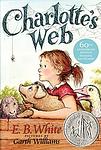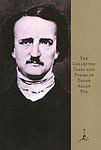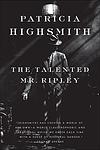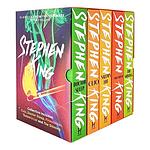The Greatest American "Fiction" Books Since 1900
Click to learn how this list is calculated.
This list represents a comprehensive and trusted collection of the greatest books. Developed through a specialized algorithm, it brings together 294 'best of' book lists to form a definitive guide to the world's most acclaimed books. For those interested in how these books are chosen, additional details can be found on the rankings page.
Genres
Countries
Date Range
Reading Statistics
Click the button below to see how many of these books you've read!
Download
If you're interested in downloading this list as a CSV file for use in a spreadsheet application, you can easily do so by clicking the button below. Please note that to ensure a manageable file size and faster download, the CSV will include details for only the first 500 books.
Download-
26. Charlotte's Web by E. B. White
A young girl named Fern saves a runt piglet from being slaughtered and names him Wilbur. When Wilbur grows too large, he is sent to live in her uncle's barn, where he befriends a clever spider named Charlotte. When Wilbur's life is in danger again, Charlotte weaves messages into her web to convince the farmer that Wilbur is too special to kill. The book explores themes of friendship, sacrifice, and the cycle of life.
-
27. Dune by Frank Herbert
Set in a distant future, the novel follows Paul Atreides, whose family assumes control of the desert planet Arrakis. As the only producer of a highly valuable resource, jurisdiction over Arrakis is contested among competing noble families. After Paul and his family are betrayed, the story explores themes of politics, religion, and man’s relationship to nature, as Paul leads a rebellion to restore his family's reign.
-
28. Fahrenheit 451 by Ray Bradbury
In a dystopian future where books are banned and burned by the government to prevent dissenting ideas, a fireman named Guy Montag, whose job is to burn books, begins to question the society he serves. After a series of events, including meeting a free-thinking teenager and witnessing a woman choosing to die with her books, Montag begins to secretly collect and read books, leading to his eventual rebellion against the oppressive regime. The narrative serves as a critique of censorship, conformity, and the dangers of an illiterate society.
-
29. A Farewell to Arms by Ernest Hemingway
Set during World War I, the novel follows an American ambulance driver in the Italian army and his love affair with a British nurse. The story is a first-person account of the protagonist's experiences in war and his struggle to survive amidst chaos and destruction. The narrative explores themes of love, war, and the fragility of life, culminating in a tragic ending that underscores the futile nature of war and the inevitable suffering it brings.
-
30. The Complete Tales and Poems of Edgar Allan Poe by Edgar Allan Poe
This collection brings together all of the author's most famous works, including poems, short stories, and novellas. Known for his macabre and gothic storytelling, the author's works are filled with themes of death, love lost, and human frailty. Notable inclusions are the haunting poem "The Raven," the chilling stories "The Tell-Tale Heart" and "The Fall of the House of Usher," and his only complete novel, "The Narrative of Arthur Gordon Pym."
-
31. My Antonia by Willa Cather
This novel follows the life of Antonia Shimerda, a Bohemian immigrant to the United States, through the eyes of her childhood friend, Jim Burden. The narrative explores their lives in the harsh environment of the American Midwest, their struggles with poverty, cultural adaptation, and personal growth. Antonia's resilience, strength, and love for life inspire Jim, who moves away for education and career but remains emotionally tied to the woman and the prairie life he left behind. The book is a compelling portrayal of pioneer life, human resilience, and the enduring power of friendship.
-
32. The Heart Is A Lonely Hunter by Carson McCullers
The novel explores the spiritual isolation of misfits and outcasts in a small town of the U.S. South. Its protagonist is a deaf-mute who becomes the confidant for various troubled souls including a black physician, a bitter labor activist, a lonely young girl, and a struggling café owner. Each pours their heart out to him, but he remains unable to respond, reflecting the deep human need for connection and understanding.
-
33. Rabbit, Run by John Updike
The novel follows the life of a 26-year-old former high school basketball star, who is dissatisfied with his current life. He impulsively leaves his wife and son and embarks on a journey in the hopes of finding a more meaningful existence. His decisions, however, lead to a series of tragic events that impact the lives of those around him. This mid-20th-century novel explores themes of freedom, responsibility, and the tragic consequences of impulsive decisions.
-
34. Song of Solomon by Toni Morrison
The novel explores the life of an African-American man, Macon "Milkman" Dead III, from birth to adulthood. Set against the backdrop of racial tension in the mid-20th century United States, it delves into his journey of self-discovery and understanding his heritage. As Macon embarks on a literal and figurative journey south to reconnect with his roots, he encounters various characters that help him understand his family history and the power of community. The narrative is deeply rooted in African-American folklore and mythology, offering a profound commentary on identity, personal freedom, and the destructive power of racism.
-
35. The Maltese Falcon by Dashiell Hammett
This classic detective novel follows a private investigator who is hired by a mysterious woman to track down her missing sister. The case quickly becomes complicated when the investigator is caught up in a dangerous hunt for a priceless artifact, the Maltese Falcon. As he navigates a world of treachery, deceit, and murder, he must use his wit and courage to outsmart his enemies and solve the mystery.
-
36. Portnoy's Complaint by Philip Roth
The novel is a first-person narrative, a monologue by a young Jewish man, Alexander Portnoy, who is speaking to his psychoanalyst. He shares his struggles with his identity as a Jewish man in America, his sexual fantasies and frustrations, his complex relationship with his overbearing mother, and his experiences of guilt and shame. The book uses humor and frank language to explore themes of identity, sexuality, and the Jewish experience in America.
-
37. The House of Mirth by Edith Wharton
Set in the backdrop of New York's high society during the turn of the 20th century, the novel follows the life of Lily Bart, a beautiful but impoverished woman of social standing. As she navigates the pressures and expectations of her social circle, Lily grapples with the need to secure a wealthy husband to maintain her lifestyle. However, her romantic inclinations and her desire for personal freedom come into conflict with societal norms, leading to her tragic downfall.
-
38. The Talented Mr. Ripley by Patricia Highsmith
The Talented Mr. Ripley is a psychological thriller that follows the story of Tom Ripley, a young man struggling to make ends meet in New York City. When a wealthy shipbuilder mistakes Tom for a close friend of his son, Dickie Greenleaf, he offers him an all-expenses-paid trip to Italy to persuade his wayward son to return home. Instead, Tom becomes obsessed with the luxurious lifestyle of Dickie and his girlfriend, Marge, and goes to extreme lengths to make it his own, including identity theft and murder.
-
39. The Call of the Wild by Jack London
This book tells the story of a domesticated dog named Buck who is stolen from his home in California and sold into service as a sled dog in Alaska. As he faces harsh conditions and brutal treatment, Buck must learn to adapt to the wild and harsh environment, ultimately reverting to his ancestral instincts in order to survive. The book explores themes of nature versus nurture, civilization versus wilderness, and the struggle for dominance.
-
40. The Long Goodbye: A Novel by Raymond Chandler
This novel follows the story of a hard-boiled detective in Los Angeles who becomes embroiled in a complex case when he befriends a drunk named Terry Lennox. After Lennox's wife is found dead, Lennox disappears to Mexico and the detective is left to unravel the mystery. The detective then takes on another case of a missing husband, which becomes intertwined with the Lennox case, leading to a web of deceit, corruption, and murder. The detective's pursuit of the truth leads him through a gritty and corrupt world, testing his resolve and morality.
-
41. Tender Is the Night by F. Scott Fitzgerald
Set in the French Riviera in the 1920s, the novel traces the tragic tale of a young psychiatrist, his beautiful wife, and the drama that unfolds amongst their circle of wealthy expatriate friends. The psychiatrist's wife suffers from mental illness, which leads to his own downfall as he struggles to keep his marriage intact and maintain his professional reputation. The narrative explores themes of wealth, love, desire, and the destructive power of obsession, painting a haunting portrait of the dark side of the glamorous Jazz Age.
-
42. All the King's Men by Robert Penn Warren
"All the King's Men" is a political drama that revolves around the rise and fall of a Southern governor, loosely based on Louisiana's Huey Long. The story is narrated by a journalist who becomes the governor's right-hand man, offering an inside perspective on the political machinations, corruption, and personal tragedies that accompany the governor's climb to power. The novel explores themes of power, corruption, and the moral consequences of political ambition.
-
43. An American Tragedy by Theodore Dreiser
This classic novel explores the dark side of the American Dream through the story of a young man who, despite his humble beginnings, aspires to climb the social ladder. He becomes involved with two women, one wealthy and one from a working-class background. His ambition and desire for status lead him to commit a crime that ultimately results in his downfall. The novel is a stark examination of the destructive power of unchecked ambition and the moral compromises people are willing to make in pursuit of wealth and status.
-
44. Light in August by William Faulkner
Set in the American South during the 1930s, this novel explores complex social and personal issues through the intertwining stories of its characters. The narrative primarily follows a man of ambiguous racial identity on a quest to find his father, a pregnant woman searching for the father of her unborn child, and a disgraced minister attempting to navigate his own moral compass. The book delves into themes of identity, race, and the human struggle for understanding and redemption, all set against the backdrop of the deep-rooted prejudices and social norms of the time.
-
45. Blood Meridian by Cormac McCarthy
Set in the mid-19th century, this novel follows a violent teenager known as "the Kid" as he joins a group of Indian-hunters led by the enigmatic and brutal Judge Holden. The narrative is a gruesome depiction of the lawless American West, filled with philosophical musings, vivid descriptions of the harsh landscape, and brutal, relentless violence. The story explores themes of human nature, morality, and the inherent chaos and brutality of life.
-
46. A Confederacy of Dunces by John Kennedy Toole
The novel is a comedic satire set in New Orleans in the early 1960s, centered around Ignatius J. Reilly, a lazy, eccentric, highly educated, and socially inept man who still lives with his mother. Ignatius spends his time writing a lengthy philosophical work while working various jobs and avoiding the responsibilities of adulthood. The story follows his misadventures and interactions with a colorful cast of characters in the city, including his long-suffering mother, a flamboyant nightclub owner, a beleaguered factory worker, and a frustrated hot dog vendor.
-
47. Fear and Loathing in Las Vegas: A Savage Journey to the Heart of the American Dream by Hunter S. Thompson
This book is a semi-autobiographical novel that chronicles the adventures of a journalist and his attorney as they embark on a drug-fueled trip to Las Vegas. The narrative is a wild and hallucinatory exploration of the American Dream, filled with biting social commentary and outrageous antics. The protagonist's quest for the American Dream quickly devolves into an exploration of the darker side of human nature, highlighting the excesses and depravities of 1960s American society.
-
48. The Shining by Stephen King
A recovering alcoholic accepts a job as a winter caretaker at a remote Colorado hotel, hoping the isolation will help him reconnect with his wife and young son, and work on his writing. However, the hotel has a dark history and a powerful malevolent presence that influences him into violence, while his psychic son sees horrific forebodings from both past and future. As the winter weather leaves them snowbound, the father's sanity deteriorates, leading to a terrifying climax.
-
49. The Adventures of Augie March by Saul Bellow
"The Adventures of Augie March" is a novel set in Chicago during the Great Depression. The story follows the life of Augie March, a poor but spirited boy growing up in a broken home, as he navigates his way through life. The narrative explores his various jobs, relationships, and adventures, as he constantly seeks his identity and place in the world. His journey is marked by a series of encounters with different people and experiences, each shaping him in unique ways.
-
50. Gravity's Rainbow by Thomas Pynchon
Set during the end of World War II, the novel follows Tyrone Slothrop, a lieutenant in the U.S. Army, as he tries to uncover the truth behind a mysterious device, the "Schwarzgerät", that the Germans are using in their V-2 rockets. The narrative is complex and multi-layered, filled with a vast array of characters and subplots, all connected by various themes such as paranoia, technology, and the destructive nature of war. The book is known for its encyclopedic nature and its challenging, postmodernist style.
Reading Statistics
Click the button below to see how many of these books you've read!
Download
If you're interested in downloading this list as a CSV file for use in a spreadsheet application, you can easily do so by clicking the button below. Please note that to ensure a manageable file size and faster download, the CSV will include details for only the first 500 books.
Download























